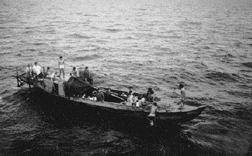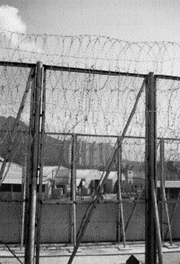

HELLO CRUEL WORLD
ANDREW LAM (Pacific News Service) 
EDITOR'S NOTE: As 35,000 Vietnamese refugees scattered in camps across Southeast Asia are herded back home, the lesson is sobering: the world "outside" -once filled with promise- is now no different from the world "inside." "There is no place left to flee. PNS editor Andrew Lam, a former refugee from Vietnam, has visited refugee camps in Hong Kong and Cambodia. 

The image once gripped us- a small boat crowded with Vietnamese refugees bobbing on a vast, merciless sea. From its mast a ragged SOS flag flew while its equally ragged passengers waved thin arms at passing ships. Their sign said, "Help us. We Love Freedom. We Love USA!"
Once we couldn�t get enough of their stories. Today as the refugee crisis has become a globe-spanning pandemic, the charm we felt at the asylum-seeker�s naive enthusiasm for our homeland has turned into resignation and fear. The 35,000 boat people of Southeast Asia now being herded back to Vietnam have no place in our New World Order narrative.
But stories are all that the refugees possess -all that stand between their freedom and forced repatriation. It is much easier not to listen, to label them instead economic refugees and ship them back, a bunch of liars, stripped of their stories at the end of history.
Such will soon be the fate of Mr. Diep Tran, a former second lieutenant in the South Vietnam army. Caught while trying to escape in 1979, he was tortured and sent to a re-education camp while his wife was forced to live with a communist cadre to prevent her family from being blacklisted. When he and his son finally did reach Hong Kong, he was denied refugee status because he lacked the $3,000 cash demanded by a screening official. In protest, his son, Anh Huy, committed self-immolation in front of the UN High Commission on Refugees office.
 Mrs. Huong Nguyen spent ten years at forced labor in a New Economic Zone, clearing jungle, watching her fellow laborers get blown to bits by land mines. She was pregnant and had a one-year-old child. Her husband, a South Vietnamese lieutenant, had been killed while trying to escape from a re-education camp. She escaped in 1985 with her sons but wound up separated from them. In the end, they were screened in but she was screened out in the Philippines.
Mrs. Huong Nguyen spent ten years at forced labor in a New Economic Zone, clearing jungle, watching her fellow laborers get blown to bits by land mines. She was pregnant and had a one-year-old child. Her husband, a South Vietnamese lieutenant, had been killed while trying to escape from a re-education camp. She escaped in 1985 with her sons but wound up separated from them. In the end, they were screened in but she was screened out in the Philippines.
Lam A Lu was Montagnard tribesman who fought for the U.S. and was sent to hard labor and tortured before he escaped. Hong Kong authorities judged his story a lie and denied him asylum, despite the seven bullet wounds in his body.
If I am was rejected, his fellow detainees wondered in despair, who could get accepted? Certainly not the Buddhist monk who fled Vietnam because he was forbidden to perform ceremonies; nor the Catholic nun who was punished for singing Catholic songs. And certainly not a number of men and women who had worked for the U.S. armed forces as soldiers, interpreters, office workers during the war.
For these story tellers, the end of the story is this: the free world no longer exists. "It is the same inside Vietnam," says one refugee, "as it is outside."
Sometimes it is worse outside. Were it not for the cruelty of the joke, Mrs. Huong Nguyen would find her story almost laughable. Her sons, who share the same history as their mother, now live in Santa Ana, CA. Their mother has become a living ghost.
Visit one of the boat peoples� camps and the living ghosts will besiege you with their pleading eyes as they try to tell you their stories. The world has turned upside down, they will tell you, during the years they have been incarcerated.
A child born inside the camps knows only a world of chicken-wire fences, cement courtyards, red plastic food pails and bunk beds surrounded with thin curtains -"my house," he calls it. High overhead jumbo jet planes soar across the Hong Kong horizon and voices on the cellular phones negotiate across multiple time zones. "Is it true, Uncle," the child asks a visitor, "that at the red light you stop and at the green light you go?"
For the boat people, the light has turned permanently red. They once raced toward the free world when iron curtains still divided the world and it was understood that risking one�s life for freedom was a good thing. The myth ended midway in their flight. The misfortune was not that they were liars but that history made liars of them.
For the West, the lesson is sobering. The outside, the refugee tells us, has become the inside. The business of protecting refugees has turned into the business of protecting the West from asylum seekers themselves.
No one will speak up for the Vietnamese refugees but perhaps that is beside the point. The boat people, kicking and screaming as they are carted off to airplanes for the journey home, warn us that it is our misfortune we can no longer hear them. For it is we, not they, who sit in the dark, our hands on our ears, like poor, huddled masses. 
